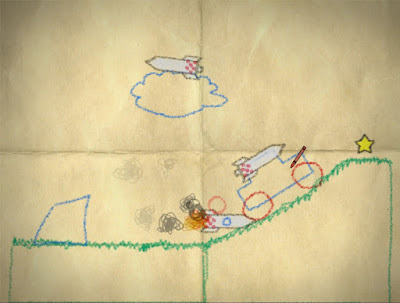Physics. My worst enemy? Probably not. No, of course not. Plastic instruments are my worst enemy from this 1001 list. Physics-based puzzles are a step or two above, sometimes working well for me, sometimes not.
I often have to go back to the drawing board on many occasions when struggling to work out a solution to a physics-based problem. In Crayon Physics Deluxe, everything is that drawing board. Scribble a ramp and you've got a ramp. A makeshift golf club on a pivot point and gravity will swing that sucker in what you hope is a useful manner.
Let's put it to the test, shall we?
Fun Times
Crayon Physics Deluxe is as simple as doodling on a scrap of paper and seeing if it works, and erasing your lines in an instant if they don't.
Draw a box, it says, and that box then falls to the ground, pushes the ball towards the star and completes the first level. Draw a line, it says, and the line falls onto the top of the castle, blocks all the holes, and allows you to roll the ball over towards the star to complete another level - and this time, you don't even need to drop any boxes. A click of your mouse on the ball will give it a little oomph to get moving.
Complete levels to earn stars, earn enough stars to set sail from one island to another, more challenging ones. It's that simple.
Along the way, you'll be introduced to various mechanics like pivot points, where a contraption will swing around a point under the influence of whatever nudge you've given it, usually a block dropped onto one end.
I don't think you need to scribble in the inside of the block, but if it gives it more mass, then I'm going to scribble away. As the introduction to the game says, it's not about finding just any solution, it's about finding the awesomest one.
Was it awesome? Probably not, but it got the ball to the star and that's all that mattered.
You can delete whatever you've done at any point, which comes into play when you have to drop blocks onto seesaws, but quickly remove them to allow the ball to keep rolling, for example. Is that the kind of awesome we need to work towards?
Pulleys were fun and wobbly as well, though they were sometimes successful through a little bit of luck rather than a well thought out plan, but I was by this point a little lost in the world of Crayon Physics Deluxe.
It's a little strange, calling it a world, but it's presented as the idle, yet purposeful scribbles of a young kid just exploring the way stuff works. It's well-disguised physics homework, and though I'm rushing through it to see what sort of challenges there are, I'm enjoying it more than most other physics-based offerings this 1001 list has thrown up.
Frustrations
There are still moments where I am bemused by what lay before me. This pivoting thing worked insofar as it got the ball to the star, but why a giant, poorly drawn banana has enough momentum to get the job done, I do not know.
As I ventured into newer island challenges, I resorted to what I knew had previously worked and started to struggle to get those strategies to keep proving fruitful, simply because I couldn't see any other way of doing things, awesome or not.
By the time rockets were introduced, which went off with the slightest of knocks, violently pushing whatever was in their way, my brain was all out of ideas as to how I was actually meant to use them. I imagined tying them to bits of string and anchoring the other end to some point, but I can't draw string, I don't thik. Lines are lines, rod-like and immovable, except for all the times they fall over when you don't want them to.
Final Word
I knew I would only put a little time in Crayon Physics Deluxe, and wouldn't be staying to try and maximise any scores or unlock any impressive challenges. I'm just not interested in these kinds of games.
And yet.
Crayon Physics Deluxe makes the whole idea of coming up with a plan easy and fun because it looks like you aren't coming up with a finished plan at all. It's all scribbles and imprecise shapes that either work or don't, or if you're lucky, work well enough to trigger an idea that might work much better.
You build finished ideas, else the levels would never end, but it doesn't feel like you do. It just feels like you're playing around, and if you happen to come up with a solution, great. If not, oh well, just doodle something else.
It's trial and error learning without the sense of punishment, I guess. Not that other physics-puzzlers punish you, just that I feel like a mistake in other games is a failure, but a mistake in Crayon Physics Deluxe is a chance to draw something else, and drawing is plain and simple fun.
Will I spend more time playing around with Crayon Physics Deluxe? It's nowhere near the top of the list of games I must get back to, but it's an awful lot higher than other physics-based games, of which this 1001 list seems to have thrown out quite a few.
It's well worth playing because, finally, that's what it feels like you're doing.
Fun Facts
The original Crayon Physics took a few days to develop. The Deluxe release took nearly two years.
Crayon Physics Deluxe, developed by Petri Purho, first released in 2009.
Version played: PC, 2009.














